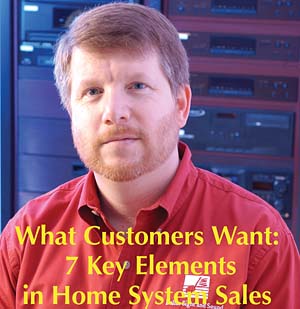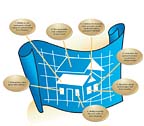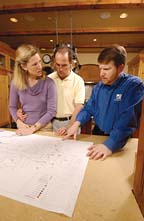
As a salesperson of low-voltage systems for the home, don’t you wish you could sometimes get inside of a customer’s mind? What do customers really think is important when buying a home system? To reveal their thoughts, SDM asked the people closest to them – home systems dealers – and asked them to rank the factors that are most important to their customers during a sale.
Surprisingly, cost is one of the least important concerns that home systems salespeople face. More meaningful considerations – according to the survey – are the convenience of buying multiple systems from one contractor; a company’s reputation for high-quality service; and guidance in selecting the right systems for a homeowner’s lifestyle.

Convenience of One Vendor
Customers usually demand that a company have the ability to sell a broad range of home systems. They want to work with one contractor to design and install a home theater, security system, and audio system, for example. Purchasing all their products and systems from one company saves them time, something that all contractors who were surveyed agreed that consumers lack.Working with one contractor also provides customers with a direct line of accountability. “That gets expressed directly to us all the time. Clients want to do business with as few people as possible, especially when it comes to low voltage systems,†says David Rogers, vice president of systems design, and the founder and CEO of Dallas Sight and Sound in Addison, Texas. “A great example is when we are involved with networks or the Internet, the fact they have to deal with more than one company is frustrating. If we could provide them with dial tone, they would love it. It’s an accountability factor; they have one company to hold accountable.â€
If your company doesn't offer as many products and services as your clients would like, then a solid relationship with another contractor may also be in your clients' best interests.
“I have observed many clients who have expressed a sigh of relief when I can recommend someone,†Rogers says. “That’s one less thing they have to worry about – whether or not the audiovisual and security company are going to work well together.â€
Beyond the desire to deal with just one company, homeowners also want just one person to work with throughout a project. Integrating different technologies is a must and working with the company that specified the products should ensure that the products work well together.
Reputation for Competence
Dealers ranked the reputability and competence of a company as the second most important point that customers need in a home systems contractor. Consumers looking for home systems products talk to their friends to learn about product options, but more importantly, to learn what company is good in the business. Presenting proposals in a timely manner and providing professional service can mean the difference between getting a good referral or a tarnished reputation.“People are not going to come and see us if we don’t have a high reputation,†says Ryan Goulette, sales manager, Home Electronic Specialists, Hudson, Wis. “People want to know they are being taken care of and that we’ll be there to service them.â€
“We’ve been in business almost 20 years,†Rogers says. “By the time clients find us they know our reputation by referral. The quality of our company is evident in everything we do. It really boils down to our integrity.
“Most of our clients...their primary goal is the quality of the finished product as well as the quality of the experience that they have with everyone they work with. With the type of homes we work in, the quality of the finished product is directly proportional to the quality of the team,†he says.
Guidance in Selecting Systems
People buying a home system require guidance in choosing what products will work best with their lifestyle. The consumer looking to purchase a security system with automated front gates, surveillance, and sophisticated panic button features requires input from the dealer.“Customers come to us because they value our expertise and knowledge,†says Peter Cook, president, Automation Design & Entertainment Inc., Portage, Mich. “They know some things, but we are considered the specialist.â€
Asking questions and listening to the customer helps the dealer understand what the customer wants. The sales staff at HomeWaves in Cumming, Ga., has its customers go through their entire day from the moment they wake up until they go to bed. Discovering when life is most hectic helps salespeople discover how to simplify their customers’ needs and create a proposal to automate and secure their lifestyle.
“Convenience and control seems to be what people are interested in,†says Eddie Landry, vice president of sales at HomeWaves in Georgia. “They want us to make it so it naturally fits into their lifestyle – so it’s not frustrating or time wasting. They pay us to streamline the systems to fit their lifestyle.â€
Salespeople need to determine a customer’s technology comfort zone prior to designing a system. The salesperson can use the information to determine what type of experience the customer has with technology, and make suggestions on how to make life more convenient.
Sidebar: Adding Central Vacuums to the Mix
Often thought of as a special niche, central vacuum systems now are becoming more popular among low-voltage home systems dealers, because their sales and installation can be significantly profitable.Who buys central vacuums? Someone who is quality-conscious about how they clean and people suffering from allergies or asthma.
Central vacuum systems offer many advantages over a standard upright vacuum. First, they clean better. Central vacuum motors are two to three times more powerful than a standard vacuum. Second, a lightweight 30-ft. hose replaces a heavy vacuum. The hose plugs into a special, centrally located outlet and can reach two or three rooms from the same outlet. Third, a convenient dustpan feature allows dirt to be swept into a trapdoor operated by a person’s toe and suctioned to the main canister, eliminating bending and messy portable dustpans.
Top questions customers ask:
- What is the price?
- Do you offer the dustpan feature?
- Does it have enough suction and power to handle my size house?
- What’s better – a bag canister or bagless canister?

Sidebar: Complementary Businesses
Dallas Sight and Sound specializes in custom audio and video systems for homes, but doesn’t sell security systems. Knight Security Systems specializes in high-end security and surveillance systems for homes, but doesn’t sell audio and video. Both operate in the Dallas metropolitan area.When they met for the first time through a mutual client, “it was as if we both said to each other, ‘Where have you been all my life?’ That was the beginning of what continues to be a very fruitful relationship with Knight,†says David Rogers of Dallas Sight and Sound.
Rogers explains that for years before meeting the folks at Knight Security, his clients had been asking Dallas Sight and Sound to install other types of systems besides audio and video, because they liked the quality of workmanship that his company provided.
“All along, certain clients had asked, ‘Do you do security systems?’ and our answer was, ‘No.’ They said, ‘Do you have anyone you could recommend?’ I hadn’t met anyone that met my standards so I couldn’t recommend anyone.â€
Clients kept asking and Rogers kept thinking how to handle the situation. He was asked by one client to hire a security company as a subcontractor, because the client liked having Dallas Sight and Sound as the main contractor, but Rogers wouldn’t consider it.
“We are so service oriented, that we feel that if it’s not something we can do ourselves to maintain our quality standards, we are not interested in subcontracting just for the sake of growth,†he says.
When Rogers met the folks at Knight Security, “I began to see that Knight Security was different than every other security company. They approached their business the same way we approached ours about quality of work.†From there, they started working together on a referral basis.
“There’s another reason I don’t want to get into security,†Rogers explains. “Audio-video is fun. Telephone intercom brings convenience into your lives. But when you start talking about security you get serious – life safety issues and getting broken into and fire. It was a different mind set and different sales process.â€
The companies refer up to 36 clients a year to each other, and often work together after the sale to integrate some of their systems through a common home controller that Dallas Sight and Sound sells. Rogers says the relationship has been positive and complementary to his business.
